GROWING THE SPORT
L39ION of LA is changing the game
L39ION of Los Angeles is a US-based team focused on increasing diversity in the sport as well as being the coolest team around. Founded by Justin and Cory Williams, they have added a UCI Continental team and a women’s team for 2021. After starting as a sponsor in 2020, SRAM has recently extended and increased its commitment to the team. To celebrate, at a recent mini-training camp, we chatted with the three Williams brothers, Justin, Cory, and CJ, and Continental team member Tyler Williams (no relation) and manager Michael Roecklein. The following conversation has been edited for length and clarity.
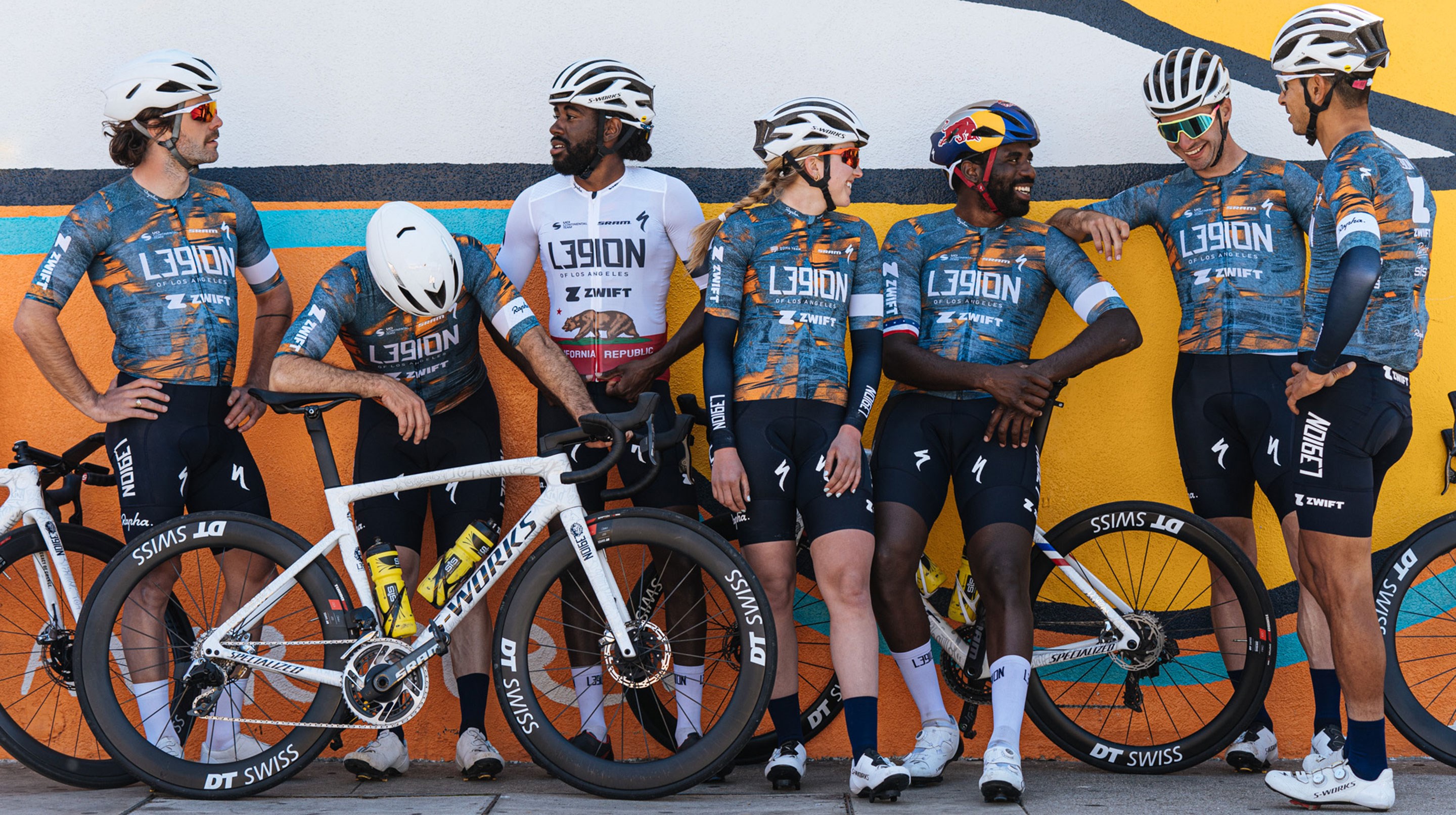
Photo by Kit Karzen
Experiencing a L39ION training ride is pretty special. People yelling “Williams brothers!” from their cars, coming up to say hi…Is that happening more and more?
Justin: It's very humbling that people care about what we're doing and who we are. I get it probably at least once a ride, if I’m on the road for more than like 3 hours or something.
CJ: Over 3 hours? That’s why he doesn’t hear it every day [laughs].
Cory: It's wild, right?
Justin: It's really crazy. I was doing my Red Bull cover shoot and some lady drove by and said “L39ION sucks, you guys don't even race bikes!” and she started laughing. It’s cool that people feel that connection where she's there popping off a joke as she drives by. That's something that I don't think I’ll ever get used to, but it's the coolest thing in the world.
Tyler: I have something to add to that: I've raced WorldTour races. I've done Amstel Gold. I've been at the highest level of sport. I never got as much attention at any race in my life as I got guest riding with these guys at Boise Twilight. Never have I felt like such a pro athlete. People seeing that big white van and start screaming “L39ION! Can I take a photo with you?” It was absolutely wild, which is what hooked me to be part of the team, honestly.
Cory: Crazy story about Tyler: it was a race in Bend, Oregon. This skinny little kid comes up to me and is like, “hey Cory, can I ride the TT course with you?” It was this dude! It’s Tyler!
Justin: He went up to you? “I'm sorry Sir. You must think that I'm a time trialist!”
Cory: Haha yeah I'm like “bro, I cannot help you with this TT.” It’s crazy to watch him grow and go to BMC and then Cycling Academy.
Justin: My story about Tyler is that like he was on Cycling Academy and I think he had been there about a year. I was looking for teams and I had sent like 250 resumes out. I knew him and I was like “hey Tyler, you’re from California, we look out for each other. I know you’re from Norcal but it's OK this time. Can you send me a contact or something?” He said “yeah man, no problem.” A lot of guys will not respond to that email. A lot of guys would say “Well, I'm worried about my job, I'm not sending you a contact to my team” but he was happy to do it. From that day I thought “alright, if this dude ever needs anything, I’m there.”
Everyone thinks that if someone comes down a level from where they were, then it's over and they quit riding. I was really proud and I knew we had the right guy when he was like “no I'm here to kick ass and take names.”
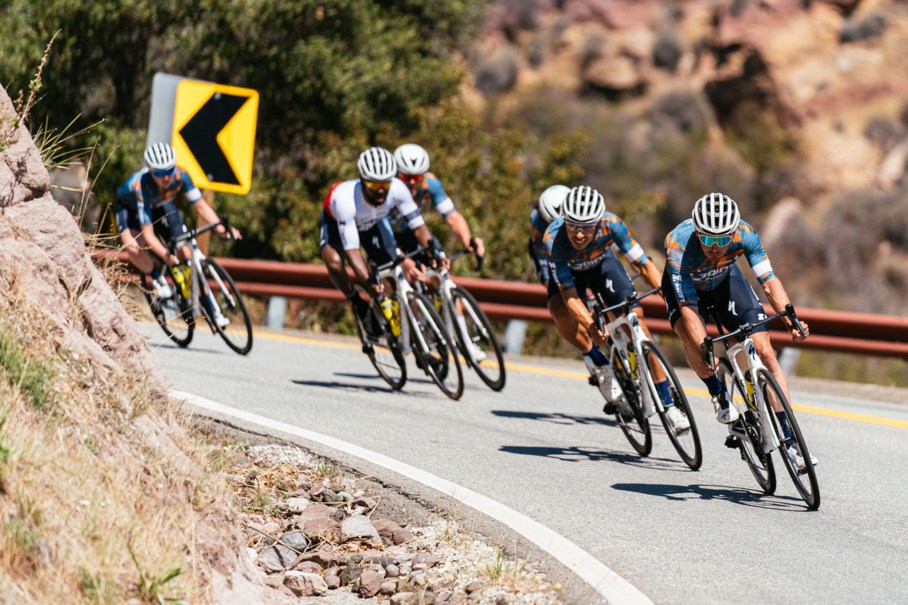
Photo by Kit Karzen
While we’re talking about Tyler, what does L39ION offer that you haven't had in the past?
Tyler: It offers me the freedom to kind of be the person I want to be. I want to be here with my wife and my son, and I've done the Europe thing. But I also take a lot of interest in how to build a team. I'm here with the sponsors doing stuff like that 'cause I'm learning. I'm becoming a more rounded person. I love riding and riding is the easiest part to do, but eventually you can't ride. So not only do I get to enjoy riding while I'm still good at it, but I can learn and be part of growing.
I took a leap of faith in a way. It's been wild, but it just gives me fulfillment 'cause I'm doing something great. Like this: this is a work trip, but it doesn't feel like work. That's the kind of life I want to have.

Photo by Kit Karzen
What is the family that you're building in terms of L39ION? It feels more than a team, like you're building a business and lifestyle too. How important is it to pick the right riders and partners?
CJ:To start off, I mean that's why we got Tyler.
Justin: Yeah, we needed another Williams.
CJ: His last name is already there. And he's already a part of the family.
Justin: He blended perfectly. It's extremely important to partner with the right people. People that believe in your vision, who are open to hearing it, who understand your vision and want to help magnify that vision. We tried to be very careful about every partner that we have because we want to build something that's beyond just a typical cycling team. We're looking for this buy-in that you don't typically get from people that are looking to go from team to team. We want really long lasting and loyal relationships, so that when we invest in something and it does blow up, we feel good about it. It's really important to pick and choose who you allow on that journey with you, because you could do something really cool with somebody and they could be gone the next day, because they don't understand what the end goal is. A lot of our partners have a very clear idea, especially after today, about what our end goals are. And I think that that's something for everyone to be excited about.
Go to those end goals.
Justin: To create something that allows for a better structure of racing, a better structure of, I don’t want to say surviving, but I want to say thriving in cycling in America.
There's a bunch of really good American racers that would race here if they could race here and afford to race here. The European peloton is amazing and what they have is really cool for where they are. I went to the World Championships in Harrogate and it was like one of the most incredible things I've ever witnessed. We just don't have that or that doesn't work here for our culture, how to shut down streets and stuff. What does work is criterium racing. I think there's an avenue to build where even if we catch the big guys coming back from Europe in their last couple of years of racing, they could use our platform to give back to the sport, to pass along knowledge that they've gained, and to make the sport better here.
Tyler: Yes, building the European stuff is amazing and beautiful and I still love it. But at the same time, it's not for everyone. You're seeing guys drop out of the WorldTour left right and center at age 30. That's not sustainable for a lot of people and it takes a very unique person to survive in that atmosphere. So if I can be a part of building something that lets you make a living doing something you love, but is also more sustainable for an athlete, then that's an amazing accomplishment too.
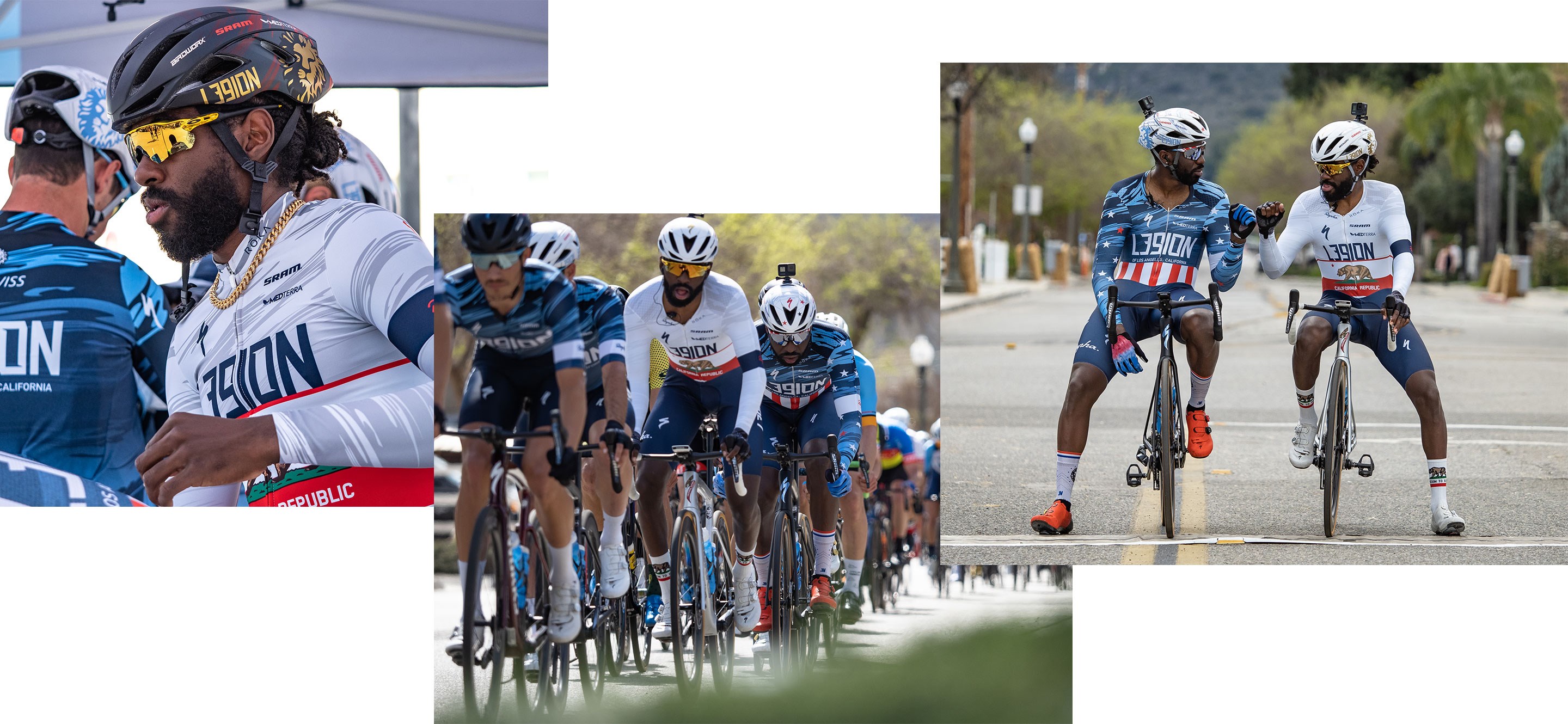
Photos by Nick Wilson
You mentioned crits. What is your reaction when people say L39ION is “just” a crit team?
Cory: I laugh at that.
Justin: That is misinformed, to put it nicely. It's misinformed.
Cory: Yeah, for sure we have a really good team all around. People like to look away from Justin's road race national championship. A lot of those people want to say this team is not a road race team when the guy that put it together is road race national champion.
Michael: The thing is, I do love crits though.
Justin: The confusion is that we grew up in a place where we've done a crit every Thursday for, I don't know, 15 years. Cycling has this kind of dark cloud over it where everyone tries to discredit and devalue people around them. When we hear “you guys are a crit team?” Well, if a race didn't have 10,000 feet of climbing in 80 miles, if it was a race that suits me, which in Europe you see there are many different types of races, we would win more road races. If there were more road races to do, we would probably win more road races, so saying that we're just a crit team is not understanding that what's going on in American cycling, it’s not paying attention to what's actually happening. We're winners; we’ll win whatever you put us in if it suits our talent. Point blank, period.
Michael: It also devalues crits. Crits aren’t just a race. They’re an amazing race!
Justin: Ooh, I’m about to go off.
Cory: Have you ever been to a stage race in America, and you finish on top of a climb, and there's no one there?
Justin: That happens at EVERY road race we go to.
Cory: And then you look at Tulsa Tough [a popular crit in Oklahoma], there's people around! At every road race...I got second place at San Dimas stage race. I got $150.
Justin: Not $5000.
Cory: Exactly. Why would I want to be good at that? Why would I want to train at that when in America we only do seven of 'em a year?
Justin: In American racing, crit racing is where that racing thrives, and that's what we want to build: a future for racing. We don't need to do what other people are doing. Criterium racing is completely separate from road racing and we're just here to make that very clear. But we're capable of doing both.
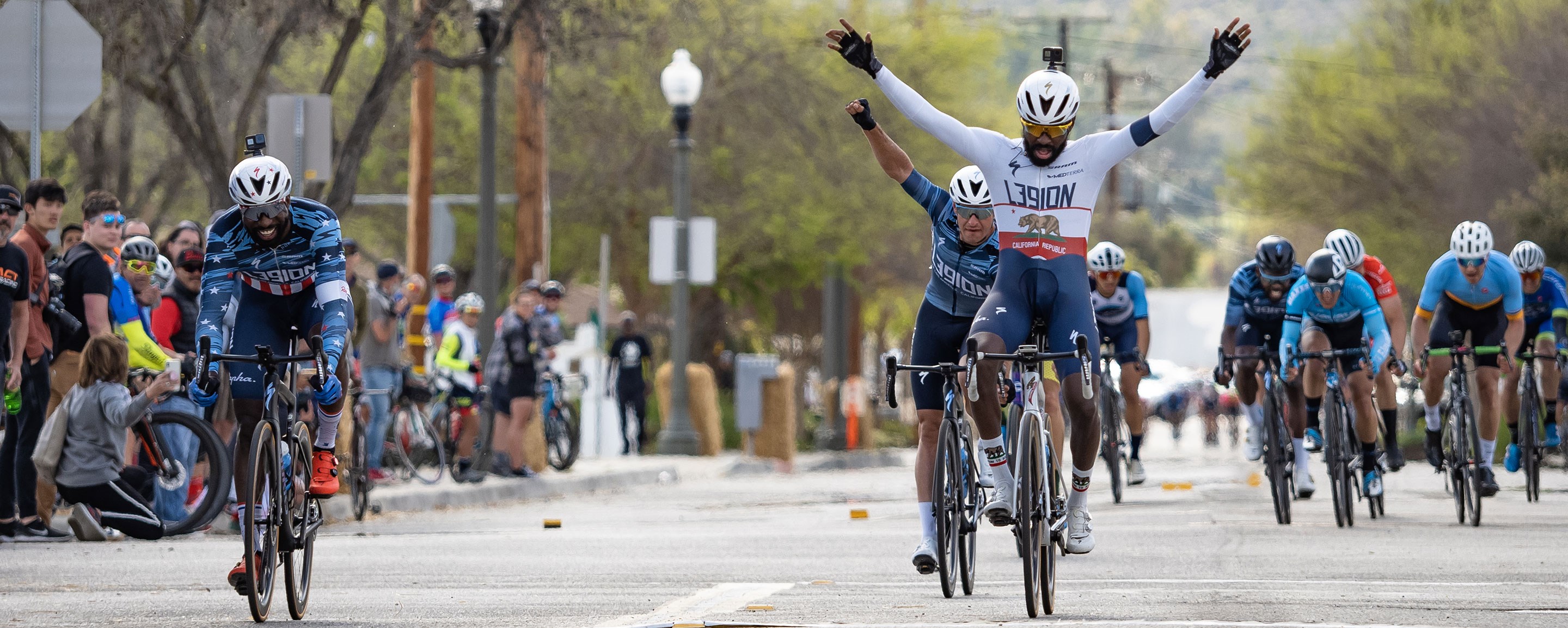
Photo by Nick Wilson
Justin, you're listed on the domestic elite team and not the UCI Conti team, yes?
Justin: Yes. It doesn't make sense for me to be on the Conti team. It doesn't mean anything to me. It's special to have a team on that level and to be a part of the journey, but for me personally, it's not my ambition to be a pro rider. That's a spot that somebody else could take when that's still their dream. That's the first part of it. The second part of it is: I'm the elite national champion. It doesn't make sense for me to move up to the pro category and not be able to wear my jersey. Because if I signed a pro contract, I can no longer wear the jersey. The title just isn't what drives me anymore. What drives me is making the sport better and making the sport more diverse, making people feel more welcome in the sport, doing really cool shit that people can aspire to and look up to.
Cory: I just think he could do a better job in that jersey.
Justin: Yeah, wearing the jersey is more important to me than having the title of pro. It's literally like where we started. Man, I spent a year by myself and you know I had to coach Cory and talk him into the perception of what it means to be pro versus what it means to do something important. And I just think it's important to wear that jersey and really, I don't want to say milk, but I want to say take advantage of how it makes people feel.
Michael: And to enjoy it! Also, you know also there's only two races you miss out on the whole calendar.
Justin: Exactly, that's another thing: you don't really miss out on anything in America not being a pro, but I think it's more of a personal thing. I'm very very, very proud to have a UCI Continental team, it's just not my position right now at this time to be a part of it.
Do the teams themselves have different ambitions or objectives?
Justin: Yeah, the pro team is here to win. They're here to do their best in races, to win races, to be ambassadors for all of our sponsors, to inspire the next generation, to try to be cool enough to make these kids want to do what they're doing. And the elite team is supposed to be working toward becoming one of those guys. Obviously, I'm in a different position. We also treat the women like we treat the pros so that there's a little bit of semantics that goes on in making it work within the system that's built right now. It’s why we have a problem and why we're trying to change things because the more you know, the less things mean, so you know the elite guys on our team were more like development riders, and I'm basically the head of the development riders and then the women get treated like pros. They're basically pros, but the way you have to do it to make it work within the UCI, it obviously can't be the way we want it to be. So we just have to play by their rules for right now.
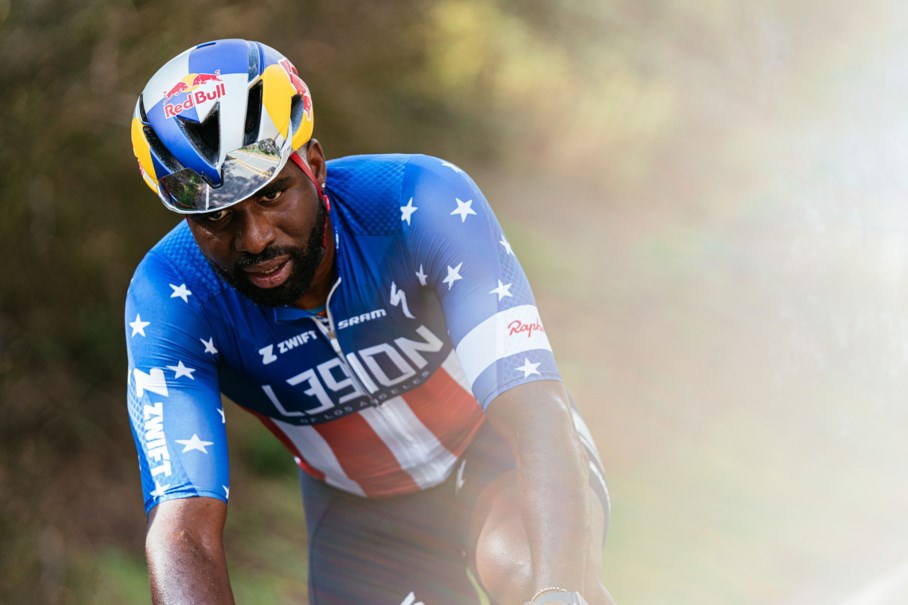
Photo by Kit Karzen
How important is winning?
Justin: Winning is extremely important.
Cory: It's so important that if we don't win, my dad don't show up to the next two races.
Justin: There was a point in our career where we stopped winning, or we just weren't winning everything. We were winning every once in a while. He literally didn't come to a race for a year.
Is it winning or the winning attitude that’s key?
Justin: A winning attitude is more important. As long as you show up and you do your job and you give it your all and everyone feels like you gave it your all... I'll probably clean up the mess at the end and still win anyway.
Cory: This guy!
CJ: Hashtag not true.
Cory: We've lost some tough battles and we've been happy that, you know, we were second or third. It's not every day you get to win, but if you guys put it all out there then you still won.
Justin: Not happy. We were very happy with the performances of all of the riders. When you guys show up in and you know that they're leaving it all out there and they're giving it their all, it's easy to just go back to the drawing board and say “OK, if you give us your all we can work with that then we can shape that into a plan that will get us a win next time.” There's a lot of races in the year.
Cory: I mean, it's easy when we do everything and Justin loses. We just blame him and it...
Justin: You'll blame me anyway!
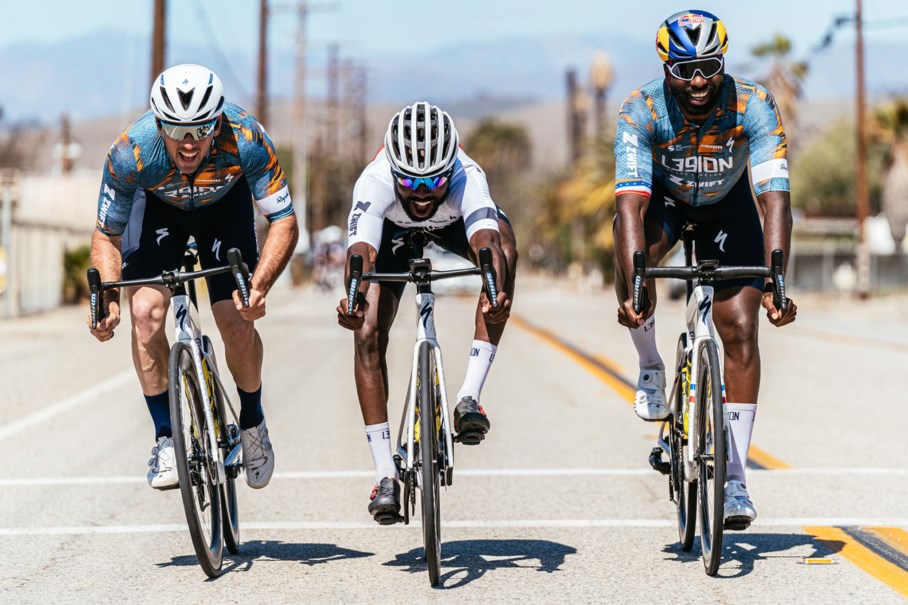
Photo by Kit Karzen
All of you were on Major Motion Cycling. What did Major Motion mean to you all in terms of getting you here?
Justin: Everything. Everything. Dave Pulliam ran Major Motion when I was a part of it. He would pick me up from my house at like 5:00 in the morning and then go pick up like two other kids before we went to go ride with Coryn Rivera and then we do like 70 miles with Kierin sprints at the end of it, and then her mom would make us dinner. It was the best days of my childhood and it made me who I am. My parents were working and didn't have time all the time, or we couldn't afford to travel or whatever the case may be, and Dave spent a lot of his own money to fund that Major Motion team when I was younger. I got to travel the country and it gave me so much perspective. It built a lot of relationships and a lot of the habits that I have today. A lot of what makes this so personal to me, building L39ION out and building this league is that there's not many people that rode when I was a junior that still ride. There's not many names that are still around that still race or even pedal a bike, and that hurts me. Major Motion was a team filled with diversity. There were Mexican kids, white kids. There were a couple of Black kids that came and went. It was full of diversity and if that team had the support and if cycling had the platform that it wasn't just Europe, who knows how many people would still be a part of this sport? Major Motion and Dave really shaped my understanding of what it means to give back and how selfish that has to be sometimes. So it makes what I'm doing pretty effortless because I know that he's given everything. This dude used to drive a 1992 Mazda van; that shit was crazy. I don't even know how it's survived for the most part.
Cory: Our dad fixed it 1000 times.
Justin: Story time! This dude’s windows stopped working on the van one time and my dad took a bicycle cable and fixed the window and I still don't know to this day what kind of black magic he used to do that. The windows were electric, not hand cranked! My dad is a MacGyver. If you need anything, SRAM, call him.
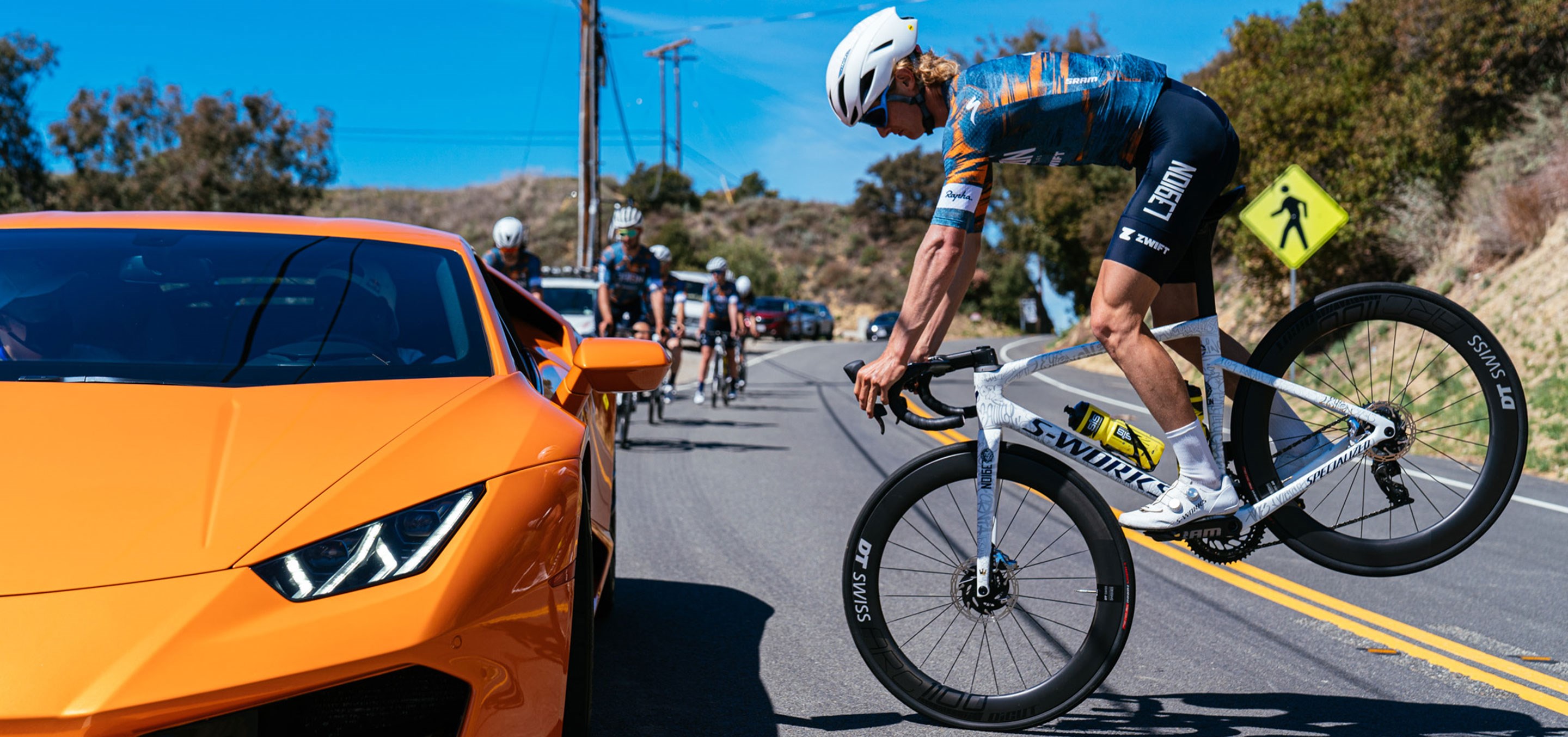
Photo by Kit Karzen
Cory, on your Instagram, you seem to make a point of showing off the off-bike parts of your life too.
Cory: Honestly, I'm just trying to reach outside of cycling. I want regular fans too. I want people to yell for me on the side of the road when I’m riding by and they don't have to be associated with bikes. I want fans that are from every sport and if I'm in tights all the time on my Instagram, no one’s gonna follow me, right? You start running out of cyclists to follow you. My reach is only so far with just riding bikes. I would love to have followers from everywhere and that's why I post different photos.
Justin: I think that what makes us really special is our ability to touch beyond the demographic of people that race, which is miniscule compared to the amount of people who ride bikes. The people who ride bikes is where we're going to be the most useful to SRAM and to any other partner that we have. And that's really why we have to maintain and build and develop that image, because those people, are a bigger demographic. We have pretty good support within the racing community, so now it's time to kind of focus on expanding outward.

Photo by Kit Karzen
Music, fashion, authenticity. That’s all a key part of L39ION?
Cory: Yeah, it’s everything. The way we carry ourselves is huge.
Justin: You should come to our house on race day.
Cory: Every single one of us, probably annoying.
Justin: We are, we really are.
Cory: I wake up like super pumped in the morning, blasting music. Here comes Justin with completely different music on...
CJ: You just walk into different zones up here.
Cory: Yeah, we listen to every type of music so he's like blasting country music, I got like Kendrick Lamar on or something.
Justin: Yeah I gotta stay calm in the beginning! I like Trisha Yearwood, she’s great. Dixie Chicks, Garth Brooks. Kenny Chesney. I like 2000s country. I need to stay calm in the mornings, but music is hyper important to who we are and what we do. It sets the tone for like what the day is gonna be like.
I'm a little bit older now. Cory can hold that energy throughout the whole day 'cause he's so angry [laughs]. But for me I need to ease my way into it so that by the time we get to the warm up of the race, that's when I'm in my Kendrick, that's when I'm in my J. Cole.
Cory: The difference is Justin is sitting back relaxing in the race sipping coffee, and I'm trying to tear everyone's legs off. He waits, then he sprints.
Justin: It's called finesse, yes.
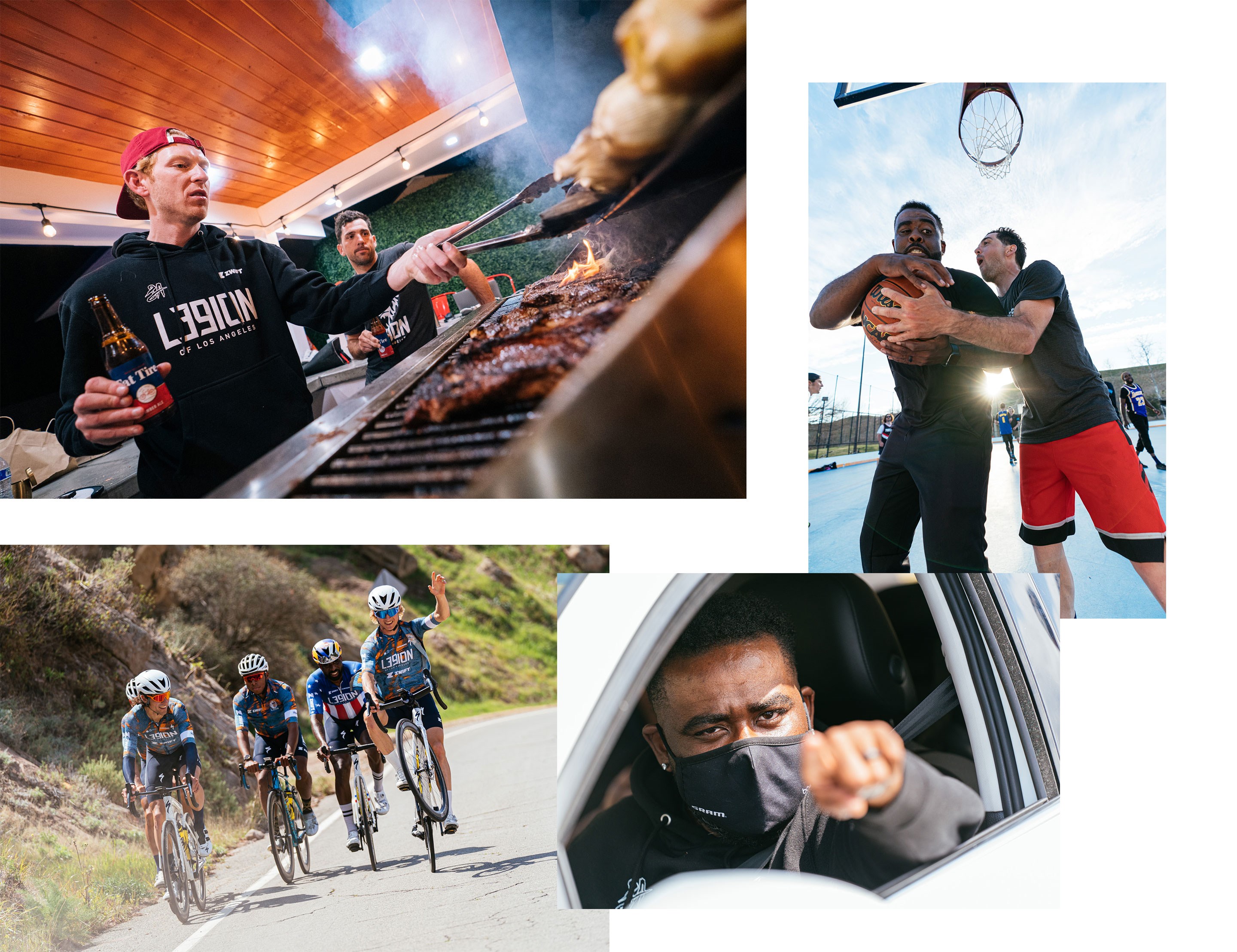
Photos by Kit Karzen
Calling L39ION a team is short selling a little. This is a business, it's a brand, it’s an identity.
Cory: It’s a family...
Justin It's hard to explain and I don't mean this in a disrespectful way, but it gets really hard to explain something really complex that no one's ever done before, so calling it a team is the easiest. We have to feed people bites at a time as we grow so that we can so we can continue to get them more and more information because when I start to go out explaining what the overall vision is, it's a mouthful. It's a lot even for my brothers. Like they get annoyed with me sometimes 'cause they're like, “bro.”
Cory: Like this interview right now?
CJ: I fell asleep three times.
Justin: But it's how it has to be, because when you're developing something completely new, it takes people a little bit of time to get on board and trust what you're doing.
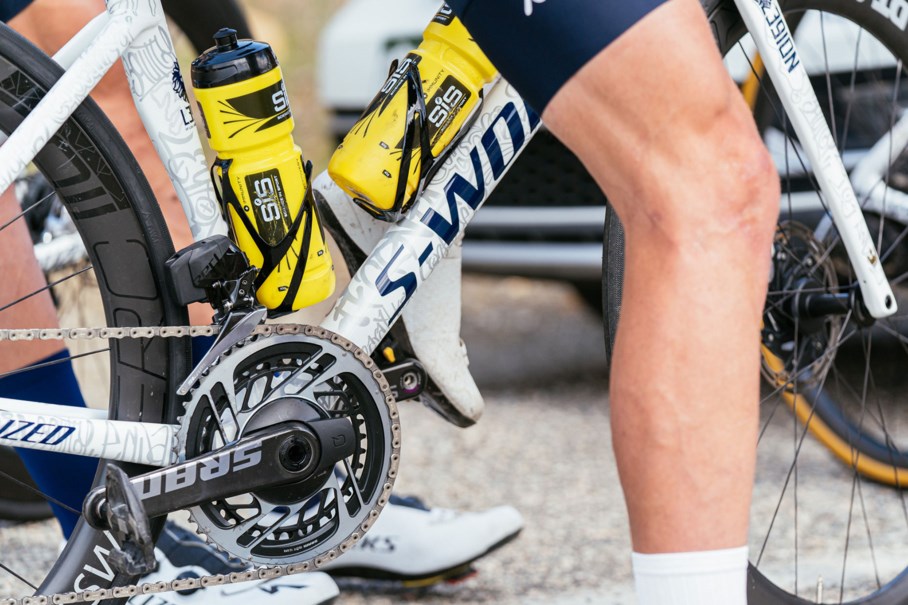
Photo by Kit Karzen
How do you choose your sponsors?
Justin: The first step is seeing what their investment in media is and how we've seen them invest in the past in marketing. That's hyper important to us. We want people that are going to be willing to spend the money on a really cool project because that just comes back to them.
Then the second thing is like we want companies that understand American culture and understand that. Anyone who's ever been to a criterium understands why criteriums are cool, right?
The next thing is quality. We want to work with the best. We want to work with the best and we want to ride the best. I can't tell you how many teams I've been on, where we're riding the second tier of whatever the company makes and companies have bullied teams into taking that just to get support. We wanted to work with companies that understood that there’s prestige in riding your best stuff. And being the coolest team is going to help us make a bigger impact than just putting us on whatever you have to support us.
Michael: The partners have to understand that we're a team that's built around individuals, and that the identities of the riders are super important. A lot of teams that these brands invest in create these cookie cutter teams where everyone has to look exactly the same and say the same thing. And if you don't foster these individual personalities you don’t get a Justin, Cory, you don’t get a Tyler.
CJ: Or a CJ? I'm sitting right here!
Michael: We can also provide opportunity for riders who aren't used to having that platform to connect with a brand that is looking to grow with someone and create. You might find that you don't really connect with what Justin's message is, but you connect more with Tyler... A lot of brands get scared of that and they know what they get when they have a team that wears exactly the same thing, shows up, walks out the bus with their mouth closed and just does their job.
Justin: I've seen brands show interest in specific riders and teams will shut it down. I think brands will want to have that opportunity, especially when there's a rider on a team that specifically loves your product. We want to engage that. If Tyler loves one thing we want to put him in as much as that as possible because he will be able to organically speak to that product and you'll be able to feel his excitement. That’s better for the sponsors, and that's better for our riders.
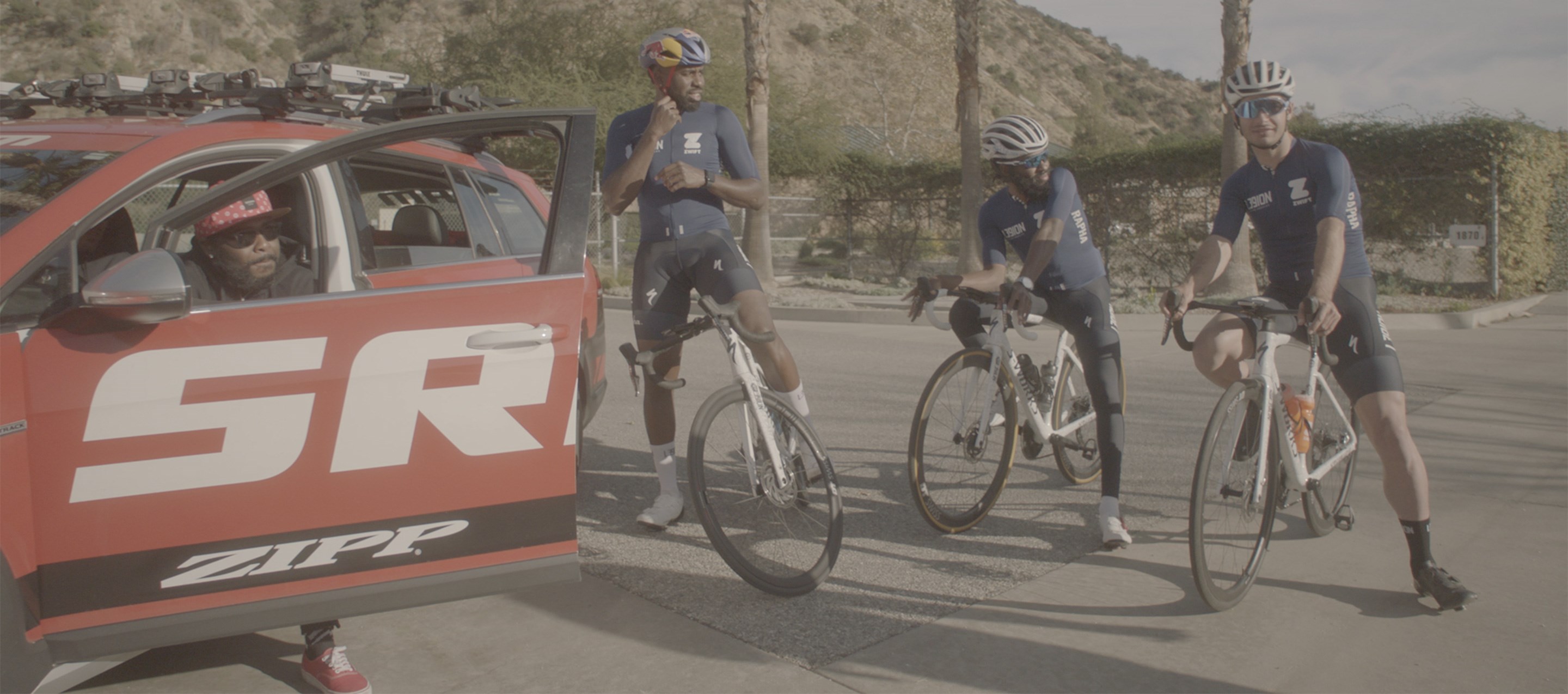
We’re entering the second year of the SRAM contract. After one year, SRAM doubled down. How's it going so far?
Justin: Ah, fantastic. One of the proudest things that I've ever accomplished was having SRAM kind of re-look at the way that they partnered with teams, and that's a lot. Being able to have a company have the understanding or have the patience to sit down and re-write a contract because someone finally had the grounds to stand up, it's been one of like the biggest accomplishments of my career so far, honestly.
Cory: I love SRAM! My battery, even when it goes red, I get five more rides on it.
CJ: Those are the short rides with Justin, under three hours.
Cory: SRAM is so awesome that if my teammate has a fully charged battery I could just flick it out and put my dead one in there.
Justin: He's done that to me before.
CJ: He doesn't even have the courtesy to put your little red tab in there.
Cory: It is awesome to break your bike down, travel and have SRAM keep working. It's the best thing in the world: it’s not complicated to put your bike back together and I love that you can adjust it on the fly! If my gears are clicking I just go boop boop boop.
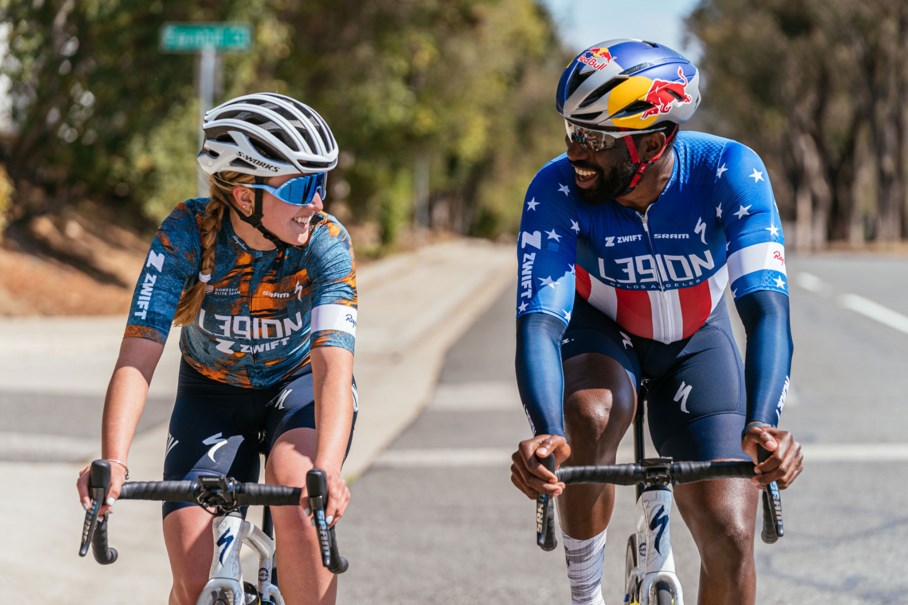
Photo by Kit Karzen
You’ve come so far in a sport that is so traditional. What does it feel like to head back to your old neighborhood and have kids recognize you and try to follow in your footsteps?
Cory: Funny story, this is how Dante Young found us. He watched my videos on YouTube. He was just riding like some bike he bought for $100… he showed up to a group ride we were on and was like, “hey, I watch y’all on video, y'all are really cool” and we're like “oh what's up man” and like from there he got on the team I coached him like we had a great relationship.
Justin: It doesn't happen often, but when it does happen, it's pretty special. Angel [Munoz] is the same case, and Angel is now on the pro team.
He's come through from when we started the CNCPT team to the beginning of the L39ION elite team and now he's on our pro team. Something like that is special; it doesn't happen every day but it's happening already. It's less about South Central [Los Angeles] specifically, and it's more just like seeing little kids of color, letting them see you and seeing yourself in them.
We still have a long way to go, but it is a very proud moment where we can be heroes to those kids, or we can be this inspiration for them to keep going because now they can see themselves at the top doing something and living a good life.
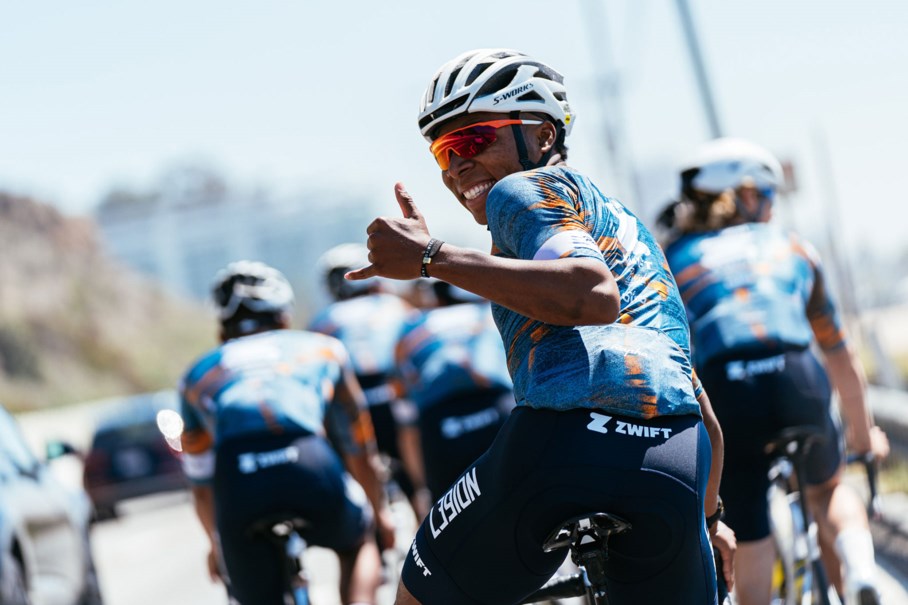
Photo by Kit Karzen
L39ION of LA will tackle a full North American racing calendar in 2021 aboard the Specialized Tarmac SL7 equipped with SRAM RED eTap AXS.